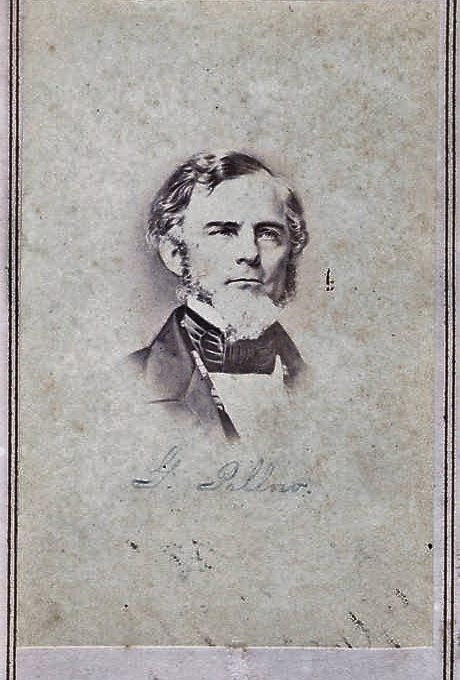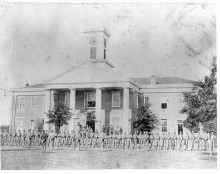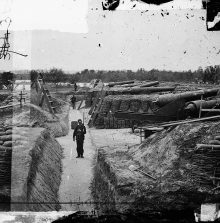ALABAMA IN MEXICO WAR
Letter to
DR. W. S. WYMAN
From
S. F. NUNNELEE
(Written June 14, 1906)
Mexico War Correspondence, Military Records Division Department Archives and History)
Part 3
About the Middle of March Gen. Scott’s army began to assemble in transports near Vera Cruz, and about the first of April we boarded ship, and the next A.M. Gen. Scott came along side in the Battle Ship, Massachusetts, I think, and asked how many troops there were aboard. Being answered he gave orders what position our vessel should take in the line, bearing down upon Castle de Ulloa and the doomed city. The Vixed in the—evening—I think it was, bore down, near shore, and drew the fire from the castle and town. Then our troops began to land in large Surf boats each holding 100 or 200 men. Gen. Worth’s Division was the first to land, then other divisions in order. We landed just as the sun was setting behind the snow capped peaks of the distant orizaba, the top shining like a sheet of silver.
HELP SUPPORT ALABAMA PIONEERS
BECOME AN ALABAMA PIONEERS PATRON
Tap to see how to Become a Patron!
The parade of the war vessels & transports, the waving of flags, the bands playing, the Surf boats making the shore, was one of the grandest sights I ever witnessed. It was just twilight when our Surf boat scraped the Sand, and as Capt. Moore (who had been unwell) was about to jump into the water, the Pet told him to straddle his neck, and we landed him high and dry, without getting his feet wet. Our Regiment formed a good line a few yards from the water’s edge, stacked arms, and lay down for a night’s rest There was no passing through the lines. It was the stillest, most beautiful starlight night I ever beheld. Before midnight the moon, like a ball of fire seemed to come up out of the water, and in a few minutes there was an alarm. Every man sprang to his feet, and at the order “take arms,” there was but one clash. It was the first and best piece of manual work the Regiment ever did, and I believe the last. Everything was soon quiet, and we stacked arms again and lay down, as before to sleep.
Sydenham Moore (Alabama Department of Archives and History)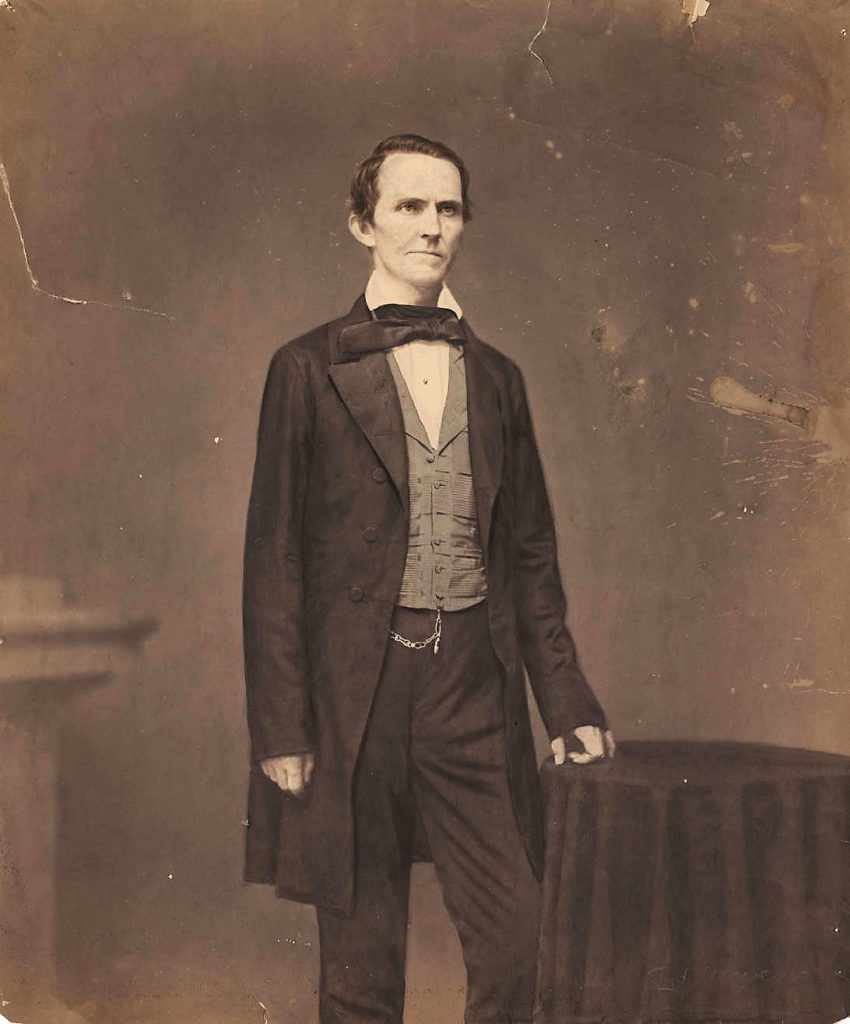
Next morning General Quitman, who had charge of our Brigade, called about dinner time, and dined with our officers, on Hard Tack and slice of bacon. That evening we moved to the West, and camped in an old opening, surrounded with dense undergrowth. It was a ticklish night, as we all expected hot work before sun rise. But everything remained quiet.
Next morning, we took up the line of March, behind the Sandhills, investing the City. About noon we reached a causway over a lagoon, the water being about knee deep. Of course, like cousin Sallie Dillard, we waded right through. We were followed by a finely uniformed Massachusetts Company, commanded by a handsome Lieutenant, when he reached the water’s edge he exclaimed, “Hell! I can’t take that”. A burly Irishman sung out, “Hould on, Liftenant I’ll bear yez on me back.” If you will Pat, I will ride you.” He straddled Pat’s neck, who started forward, cautiously feeling his way over the pole’s, till he reached the deepest part when he stumbled an fell sprawling-on purpose. He jumped up and grabbed the Lieutenant, who was floundering to gain his feet, offering the most sorrowful appologies one ever heard. But as they came out, he told the “Liftenant” to take heart; he was not much damaged,- and that he himself would take his clothes to the Laundry-man, early in the morning, with a few damns, he told him to go to hell.
Gen. Gideon Pillow (Alabama Department of Archives and History)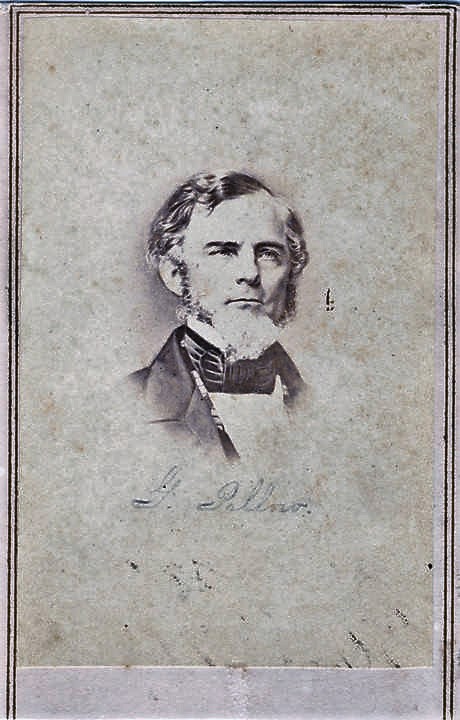
Moving forward in the dins country road, we crossed either a railroad track or macadamized road, where we got our first land view of a portion of the city to the right. Some skirmishing was going on between us and the city, and we saw some Mexicans rapidly running. Proceeding up a trail over a Steep Sand hill, we met Gen. Pillow and an aid, who was describing a military exploit, in which he said, “T three times drove the enemy from the mountain heights.” The heights, I suppose, was the crest of the sand hill which we soon attained, the Musket balls occasionally whizzing over our heads, from the top of the hill, which was clear of under growth, and we got a full view of the city, forts, and castle, one and a half to two miles to our front (North). While taking in the view, several cannon shots were aimed at us, all falling short except one. This we saw coming straight for us, falling some 30 feet in front of our company, throwing the dust all over us, we opened our files and give it a free right of way. It rolled down the sand bank 30 or 40 feet. One of us went down and brought it for inspection. It was about a 24 pound ball. Gen. Quitman was standing near, and remarked, “You boys can stand cannon balls very well.” We felt complimented, just at this time a “Smart Alec”, having it is hand, threw down the hill as far as he could, with an epithet, Gen. Quitman told him to go down and bring it up again; and the boys gave a shout of approbation. General Quitman and his aid moved forward, on foot, and like a boy, I followed. There was an occasional rifle shot in the valley below, to our right. On an opposite hill we saw a Mexican Cavalryman in the open-Squaring himself in his saddle. (I told Gen. Quitman to “Look out, he’s going to shot.” He threw his field glass on him, and remarked “I do not think he can hit one of us at that distance.” Just then we heard the ball whizzing over our heads. Why, I could not tell, the Mexican pulled off his Sombrero and waived it about twice around his head, when a Rifle cracked, and we saw him fall from his horse. He must have been an officer; for that night there was great weeping and wailing in the city.
We proceeded a mile or so, west, and pitched our camp, in what seemed to be a pass or opening, through the Sand hills to the gulf and city. A little further, west, the Georgia regiment was camped this completing the investment of the city, Our line from east to west covered about nine miles from shore to shore—the city being on the point of a promontory.
About One o’clock next day, the 3rd, after our landing, a sky rocket was sent high into the air, exploding over the castle, a signal, I suppose, that environment was complete. Then followed a number of cannon shots, ball and shell, from our guns, I suppose to draw the fire from the guns of both city and castle. Then came an order for details to work in the trenches, fill Sand bags and construct forts. This took two or three days, and we had to pack provisions from near where we landed to our extreme left; our trips often being made in the evening, so as to include twilight and darkness, when it was difficult to tell one sand hill from another, and on returning our men often missed the trail. Of course, our supply of provisions were often scant and hard to get. Fresh meat was out of the question; but our Nimrods finally got permission to scour the country for something fresh, but always returned empty handed. One day a bunch of cattle got away from the Mexican butchers, and were coming full tilt for our gap. I ran to Captain Moore for permission to shoot one of them–but he said it was against orders. I felt disappointed, and asked him if there were any orders against catching. He said no. I ran as fast as I could, and met the herd, of ten or more, half way down the slope on our side, and, throwing up my hands, inquiring where they were going. They wheeled short, and I grabbed a good sized one by the tail, and threw him around, and we “had it, over and under in the deep sand until we reached the edge of the woods, where I made him fast by the tail to a sapling, when my Brother came up with a strong cord and looped him around the horns. I fancied “tail hold” was good enough for me, and held on, until someone struck him back of the horns, and he was soon butchered, to the joy and amid the shouts of half the regiment. For a few days I was Something of a hero, being known as the boy who caught the Bull by the tail. He was divided out among the messes, field and Company officers, and for the first time in many days, we had a mess of fresh beef.
I got permission to go down to the Beach one day, and passing Gen. Twigg’s head quarters, saw one mode he had of punishing men for disobedience of orders: In front of his tent were two tubs of water, and a man at each intently fishing with a pin tied to the end of a thread attached to a pole. Every minute or two the General would come to the door & sing out-“Jerk! Why in the hell don’t you jerk.” The poor fellows were mortified half to death, and the hot sun was punishment enough.
Returning, I fell in with an intellegent Regular soldier, and he inquired as to the liberties and privileges of the Volunteers service. I explained to him as well as I could; and with a deep sigh he responded: “I would give ten years of my life to complete my term of service as a Volunteer”.
The Batteries being completed, the regular bombardment of the city opened in regular order, so many shots per minute from each battery. The fire began soon after the Rocket was sent up, and continued without cessation, for I suppose, about 36 hours or more—for the firing embraced two nights, during which there were heart rending screams and lamentations in the city. We could hear the crash of the balls and shells through the buildings,—then the explosion—followed by screams of men and women, (apparently the whole population) and hear the patter of their feet upon the pavements as they ran from one portion of the city to another, endeavoring to find some spot where the missels of death could not reach them. But these seemed to follow the wails and pattering of the feet of the multitude. It was a most pittiful scene.
A cession of firing occurred next morning, but again opened after a few hours. But after awhile it ceased again, and next morning the city Surrendered, but we were not permitted to witness it. It was said many of the Mexican Soldiers were frantic with grief—Kissing their guns as they Stepped up to stack them.
“The investment and capture of Vera Cruz was a notable event in the war with Mexico.” Yet it was accomplished in less time, and with fewer casualties than could reasonably have been expected. Captain Fairchild was the first one to be killed, at his battery east of the city. I do not remember how many were killed and wounded—perhaps 12 or 15 would cover the whole list of casualties. It was certainly a tribute to the generalship and efficiency of our entire army, and I have always felt glad that Alabama was represented in the event.
Vinegar of the Four Thieves: Recipes & Curious Tips from the Past
This book is a compilation of some of the funny and helpful tips from our past history. Some recipes and tips date back to 1770s. One or two sound a little dangerous and I would never try them myself, but I’ve included then in this book for their humorous and historical value. A few are useful, especially for our ‘green’ society today
Vinegar of the Four Thieves: Recipes & Curious Tips from the Past


